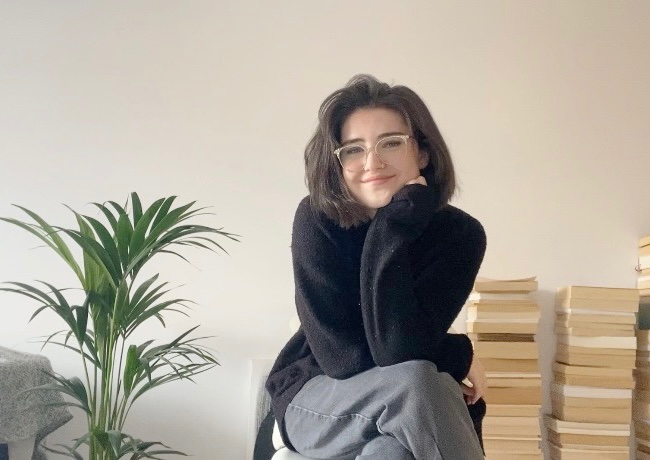In the summer of 2014, I woke up feeling sick. I had all the normal fluey symptoms but the whole-body aching was a bit more intense than normal. I assumed it would pass like the other viral infections I'd had in the previous six months but it didn't. I've been struggling with that pain and fatigue for almost seven years now. Over that time, I've received diagnoses of Chronic Fatigue Syndrome ME/CFS , fibromyalgia, Postural Tachycardia Syndrome POTS and Hypermobile Ehlers-Danlos Syndrome hEDS . Over the last few years, I've begun to identify myself as who I now am - a disabled woman.
My disabilities are mostly invisible. If you were to meet me at a party on the sofa, you'd, most likely, assume I was able-bodied. I look like a young, "healthy" woman in her mid-twenties well, a bit younger thanks to my baby face! and I don't currently use a mobility aid. While this comes with certain privileges, it also has its own difficulties - people assume I'm able-bodied and when they find out I'm not, it often leads to doubt and even denial. These misconceptions about my health have come in the form of comments like "but you look so well and you're so young", "we all get a bit tired" and "oh but if you identify as disabled, you're limiting yourself".
After the first six months of my debilitating and house-confining chronic illness, my doctor recommended nasal spray as a miracle cure for all my problems and therapy was always a go-to suggestion to improve my physical pain. The overall attitude has been "it's all in your head". Not as a general observation that everything is actually in our heads because that's where we experience pain, but as an insult.
This phrase has caused so much damage to people suffering with invisible disabilities as it denies pain, but also to people with mental health conditions also identifiable as invisible illness . At its core, "it's all in your head" is used as pure dismissal of a person's physical or mental pain and I know that rejection well. I've lost some close friendships along the way. One friend stopped talking to me because I couldn't attend their birthday party for health reasons. In their eyes, I wasn't being a good enough friend and was choosing not to go rather than unable - "it's all in your head". Another friend bought me a bunch of flowers when I was in a flare. I thought it was a breakthrough until they were overheard explaining that the flowers were just to stop me moaning about my health for a minute - "it's all in your head". Not only was I grieving the loss of my able body, but I was also faced with the grief of close friendships ending. Having an invisible health condition has made me feel hidden, misunderstood and gaslit by others and then, internalised, by myself. Writing about my physical pain - making the invisible visible - has massively helped me face the grief of these feelings and experiences. It's also allowed me to begin to work through them.
Last year, a close friend of mine, actor and producer Antonia Salib, approached me about making a film together. I'm a screenwriter and so my role was to write the script. I asked myself which story was most important for me specifically to tell and I began writing about a romantic couple navigating a chronic illness flare up. When I was studying dramatic writing, we were taught to "show, not tell" when writing a screenplay. In other words, use images rather than heavy narration to express the main character's emotions and experiences. It was when doing this that I noticed how visible my disability actually is. It's just that it's been hidden behind closed doors because people really only ever see me when I'm well enough to be out of the house.
A symptom I experience is paralysis in my arms. Sometimes, my arms will flop, become extremely heavy and painful, my fingers will swell and I lose my grip. I can't feed myself easily, open doors or break off toilet roll - all very visible things. These are three images I wrote into the script of what is now a short film in pre-production, 'Chronic'. By seeing these things on the page, right in front of me, I had a real lightbulb moment. I realised that my disability is real and that it's valid, whether that be invisible or not, or when my symptoms are flaring or not. It allowed me to face the real pain of when people had made me feel otherwise and of when I had gaslit myself into believing that I "wasn't disabled enough". That room to grieve has also allowed me to move towards acceptance of myself and my identity as a disability woman.
When I came to writing the end of the script, I was torn. Happy ending or tragic ending? She recovers or she never does? And then I understood that being disabled or chronically ill isn't the tragic ending to a story. That's just the way our ableist society sees it. I understood that you can be happy and disabled, that disability can draw a couple apart and bring them closer together. Life is light and dark no matter who you are. Writing 'Chronic', as well as working with my therapist, has helped me understand the importance of the "and" and how critical it is to growing around the grief and finding a sense of peace in the paradoxical reality of life.
I would love for you to join us on our journey of raising awareness for invisible disability through our short film, 'Chronic', by following us on social media. Instagram: @chronicfilm Facebook: @chronicshort film Twitter: @chronic_film

